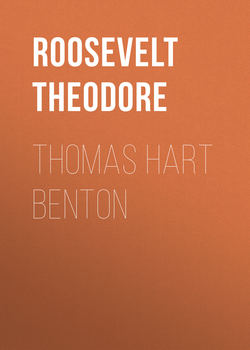Thomas Hart Benton

Реклама. ООО «ЛитРес», ИНН: 7719571260.
Оглавление
Roosevelt Theodore. Thomas Hart Benton
CHAPTER I. THE YOUNG WEST
CHAPTER II. BENTON'S EARLY LIFE AND ENTRY INTO THE SENATE
CHAPTER III. EARLY YEARS IN THE SENATE
CHAPTER IV. THE ELECTION OF JACKSON, AND THE SPOILS SYSTEM
CHAPTER V. THE STRUGGLE WITH THE NULLIFIERS
CHAPTER VI. JACKSON AND BENTON MAKE WAR ON THE BANK
CHAPTER VII. THE DISTRIBUTION OF THE SURPLUS
CHAPTER VIII. THE SLAVE QUESTION APPEARS IN POLITICS
CHAPTER IX. THE CHILDREN'S TEETH ARE SET ON EDGE
CHAPTER X. LAST DAYS OF THE JACKSONIAN DEMOCRACY
CHAPTER XI. THE PRESIDENT WITHOUT A PARTY
CHAPTER XII. BOUNDARY TROUBLES WITH ENGLAND
CHAPTER XIII. THE ABOLITIONISTS DANCE TO THE SLAVE BARONS' PIPING
CHAPTER XIV. SLAVERY IN THE NEW TERRITORIES
CHAPTER XV. THE LOSING FIGHT
American Statesmen
CRITICAL NOTICES
Отрывок из книги
Thomas Hart Benton was born on March 14, 1782, near Hillsborough, in Orange County, North Carolina,—the same state that fifteen years before, almost to a day, had seen the birth of the great political chief whose most prominent supporter he in after life became. Benton, however, came of good colonial stock; and his early surroundings were not characterized by the squalid poverty that marked Jackson's, though the difference in the social condition of the two families was of small consequence on the frontier, where caste was, and is, almost unknown, and social equality is not a mere figure of speech—particularly it was not so at that time in the Southwest, where there were no servants, except black slaves, and where even what in the North would be called "hired help" was almost an unknown quantity.
Benton's father, who was a lawyer in good standing at the North Carolina bar, died when the boy was very young, leaving him to be brought up by his Virginian mother. She was a woman of force, and, for her time, of much education. She herself began the training of her son's mind, studying with him history and biography, while he also, of course, had access to his father's law library. The home in which he was brought up was, for that time and for that part of the country, straightlaced; his mother, though a Virginian, had many traits which belonged rather to the descendants of the Puritans, and possessed both their strength of character and their austerely religious spirit. Although living in a roistering age, among a class peculiarly given to all the coarser kinds of pleasure, and especially to drink and every form of gambling, she nevertheless preserved the most rigid decorum and morality in her own household, frowning especially upon all intemperance, and never permitting a pack of cards to be found within her doors. She was greatly beloved and respected by the son, whose mind she did so much to mould, and she lived to see him become one of the foremost statesmen of the country.
.....
Like every other hot spirit of the West—and the West was full of little but hot spirits—Benton heartily favored the War of 1812. He served as a colonel of volunteers under Jackson, but never saw actual fighting, and his short term of soldiership was of no further account than to furnish an excuse to Polk, thirty-five years later, for nominating him commanding general in the time of the Mexican War,—an incident which, as the nomination was rejected, may be regarded as merely ludicrous, the gross impropriety of the act safely defying criticism. He was of genuine use, however, in calling on and exciting the volunteers to come forward; for he was a fluent speaker, of fine presence, and his pompous self-sufficiency was rather admired than otherwise by the frontiersmen, while his force, energy, and earnestness commanded their respect. He also, when Jackson's reckless impetuosity got him into a snarl with the feeble national administration, whose imbecile incapacity to carry on the war became day by day more painfully evident, went to Washington, and there finally extricated his chief by dint of threatening that, if "justice" was not done him, Tennessee would, in future political contests, be found ranged with the administration's foes. For Benton already possessed political influence, and being, like most of his class, anti-Federalist, or Democratic, in sentiment, was therefore of the same party as the people at Washington, and was a man whose representations would have some weight with them.
During his stay in Tennessee Benton's character was greatly influenced by his being thrown into close contact with many of the extraordinary men who then or afterwards made their mark in the strange and picturesque annals of the Southwest. Jackson even thus early loomed up as the greatest and arch-typical representative of his people and his section. The religious bent of the time was shown in the life of the grand, rugged old Methodist, Peter Cartwright, who, in the far-off backwoods, was a preacher and practical exponent of "muscular Christianity" half a century before the day when, under Bishop Selwyn and Charles Kingsley, it became a cult among the most highly civilized classes of England. There was David Crockett, rifleman and congressman, doomed to a tragic and heroic death in that remarkable conflict of which it was said at the time, that "Thermopylæ had its messengers of death, but the Alamo had none;" and there was Houston, who, after a singular and romantic career, became the greatest of the statesmen and soldiers of Texas. It was these men, and their like, who, under the shadow of world-old forests and in the sunlight of the great, lonely plains, wrought out the destinies of a nation and a continent, and who, with their rude war-craft and state-craft, solved problems that, in the importance of their results, dwarf the issues of all European struggles since the day of Waterloo as completely as the Punic wars in their outcome threw into the shade the consequences of the wars waged at the same time between the different Greek monarchies.
.....